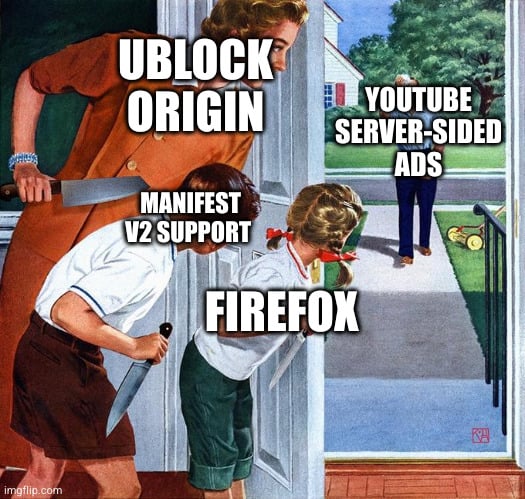this post was submitted on 10 Oct 2024
977 points (97.8% liked)
memes
11893 readers
2712 users here now
Community rules
1. Be civil
No trolling, bigotry or other insulting / annoying behaviour
2. No politics
This is non-politics community. For political memes please go to !politicalmemes@lemmy.world
3. No recent reposts
Check for reposts when posting a meme, you can only repost after 1 month
4. No bots
No bots without the express approval of the mods or the admins
5. No Spam/Ads
No advertisements or spam. This is an instance rule and the only way to live.
A collection of some classic Lemmy memes for your enjoyment
Sister communities
- !tenforward@lemmy.world : Star Trek memes, chat and shitposts
- !lemmyshitpost@lemmy.world : Lemmy Shitposts, anything and everything goes.
- !linuxmemes@lemmy.world : Linux themed memes
- !comicstrips@lemmy.world : for those who love comic stories.
founded 2 years ago
MODERATORS
you are viewing a single comment's thread
view the rest of the comments
view the rest of the comments

Cause you need to insert it every time for every viewer. People get different ads and those ads obviously change over time. So embedding one ad into the video permanently makes no sense. I'm pretty sure YouTube does it the way they do cause the alternative is not feasible.
You can still do dynamic ad serving in a stream stitched integration. It's just that the content and the ads are being served by the same CDN, hence why you can't block the ads without also blocking the content. In the manifest file there are m3u8 chucks, the file is essentially broken up into 5/10 second chunks, and when the video segment chunk is coming to an ad break, it stitches in dynamically an ad m3u8 chunk that the ad server dynamically selects based on the ads they currently have trafficked in their system.
Exactly
That wouldn't make sense in the case of hls since the stream consists of multiple fragments of a video and you would just insert the ad fragments. This would only require changing the index file which could be done again and again with no effort and needs no reencoding of the video file.
maybe ads should not be targeted.